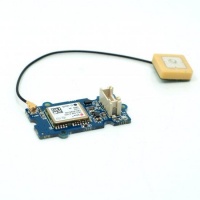Skillnad mellan versioner av "Grove - GPS"
| Rad 204: | Rad 204: | ||
[[Category:Grove]] | [[Category:Grove]] | ||
| + | [[Category:Kna-Wiki]] | ||
Versionen från 3 februari 2021 kl. 15.17
GPS-modulen är en kostnadseffektiv och fältprogrammerbar gadget som är beväpnad med en SIM28 (u-blox 6 är den gamla versionen) och seriell kommunikationskonfiguration. Den har 22 tracking / 66 förvärvskanaler GPS-mottagare. Känsligheten för spårning och förvärv uppnår båda upp till -160dBm vilket gör det till ett utmärkt val för personliga navigationsprojekt och platstjänster samt enastående bland produkter av samma prisklass.
Innehåll
Kompatibilitet
- Arduino
- Raspberry Pi
Port
- Digital (Arduino)
- RPISER (Raspberry Pi)
Mjukvara
U-center: https://www.u-blox.com/en/product/u-center-windows
Exempelkod
Arduino
#include <SoftwareSerial.h>
SoftwareSerial SoftSerial(2, 3);
unsigned char buffer[64]; // buffer array for data receive over serial port
int count=0; // counter for buffer array
void setup()
{
SoftSerial.begin(9600); // the SoftSerial baud rate
Serial.begin(9600); // the Serial port of Arduino baud rate.
}
void loop()
{
if (SoftSerial.available()) // if date is coming from software serial port ==> data is coming from SoftSerial shield
{
while(SoftSerial.available()) // reading data into char array
{
buffer[count++]=SoftSerial.read(); // writing data into array
if(count == 64)break;
}
Serial.write(buffer,count); // if no data transmission ends, write buffer to hardware serial port
clearBufferArray(); // call clearBufferArray function to clear the stored data from the array
count = 0; // set counter of while loop to zero
}
if (Serial.available()) // if data is available on hardware serial port ==> data is coming from PC or notebook
SoftSerial.write(Serial.read()); // write it to the SoftSerial shield
}
void clearBufferArray() // function to clear buffer array
{
for (int i=0; i<count;i++)
{
buffer[i]=NULL;
} // clear all index of array with command NULL
}Raspberry Pi
import serial, time
import smbus
import math
import RPi.GPIO as GPIO
import struct
import sys
#import ir_receiver_check
enable_debug=1
enable_save_to_file=0
#if ir_receiver_check.check_ir():
# print("Disable IR receiver before continuing")
# exit()
ser = serial.Serial('/dev/ttyAMA0', 9600, timeout = 0) #Open the serial port at 9600 baud
ser.flush()
def cleanstr(in_str):
out_str = "".join([c for c in in_str if c in "0123456789.-" ])
if len(out_str)==0:
out_str = "-1"
return out_str
def safefloat(in_str):
try:
out_str = float(in_str)
except ValueError:
out_str = -1.0
return out_str
class GPS:
#The GPS module used is a Grove GPS module http://www.seeedstudio.com/depot/Grove-GPS-p-959.html
inp=[]
# Refer to SIM28 NMEA spec file http://www.seeedstudio.com/wiki/images/a/a0/SIM28_DATA_File.zip
GGA=[]
#Read data from the GPS
def read(self):
while True:
GPS.inp=ser.readline()
if GPS.inp[:6] =='$GPGGA': # GGA data , packet 1, has all the data we need
break
time.sleep(0.1) #without the cmd program will crash
try:
ind=GPS.inp.index('$GPGGA',5,len(GPS.inp)) #Sometimes multiple GPS data packets come into the stream. Take the data only after the last '$GPGGA' is seen
GPS.inp=GPS.inp[ind:]
except ValueError:
print ("")
GPS.GGA=GPS.inp.split(",") #Split the stream into individual parts
return [GPS.GGA]
#Split the data into individual elements
def vals(self):
if enable_debug:
print(GPS.GGA)
time=GPS.GGA[1]
if GPS.GGA[2]=='': # latitude. Technically a float
lat =-1.0
else:
lat=safefloat(cleanstr(GPS.GGA[2]))
if GPS.GGA[3]=='': # this should be either N or S
lat_ns=""
else:
lat_ns=str(GPS.GGA[3])
if GPS.GGA[4]=='': # longitude. Technically a float
long=-1.0
else:
long=safefloat(cleanstr(GPS.GGA[4]))
if GPS.GGA[5]=='': # this should be either W or E
long_ew=""
else:
long_ew=str(GPS.GGA[5])
fix=int(cleanstr(GPS.GGA[6]))
sats=int(cleanstr(GPS.GGA[7]))
if GPS.GGA[9]=='':
alt=-1.0
else:
# change to str instead of float
# 27"1 seems to be a valid value
alt=str(GPS.GGA[9])
return [time,fix,sats,alt,lat,lat_ns,long,long_ew]
# Convert to decimal degrees
def decimal_degrees(self, raw_degrees):
try:
degrees = float(raw_degrees) // 100
d = float(raw_degrees) % 100 / 60
return degrees + d
except:
return raw_degrees
if __name__ == "__main__":
g=GPS()
if enable_save_to_file:
f=open("gps_data.csv",'w') #Open file to log the data
f.write("name,latitude,longitude\n") #Write the header to the top of the file
ind=0
while True:
time.sleep(0.01)
try:
x=g.read() #Read from GPS
[t,fix,sats,alt,lat,lat_ns,longitude,long_ew]=g.vals() #Get the individial values
# Convert to decimal degrees
if lat !=-1.0:
lat = g.decimal_degrees(safefloat(lat))
if lat_ns == "S":
lat = -lat
if longitude !=-1.0:
longitude = g.decimal_degrees(safefloat(longitude))
if long_ew == "W":
longitude = -longitude
# print ("Time:",t,"Fix status:",fix,"Sats in view:",sats,"Altitude",alt,"Lat:",lat,lat_ns,"Long:",long,long_ew)
try:
print("Time\t\t: %s\nFix status\t: %d\nSats in view\t: %d\nAltitude\t: %s\nLat\t\t: %f\nLong\t\t: %f") %(t,fix,sats,alt,lat,longitude)
except:
print("Time\t\t: %s\nFix status\t: %s\nSats in view\t: %s\nAltitude\t: %s\nLat\t\t: %s\nLong\t\t: %s") %(t,str(fix),str(sats),str(alt),str(lat),str(longitude))
s=str(t)+","+str(safefloat(lat)/100)+","+str(safefloat(longitude)/100)+"\n"
if enable_save_to_file:
f.write(s) #Save to file
time.sleep(2)
except IndexError:
print ("Unable to read")
except KeyboardInterrupt:
if enable_save_to_file:
f.close()
print ("Exiting")
sys.exit(0)